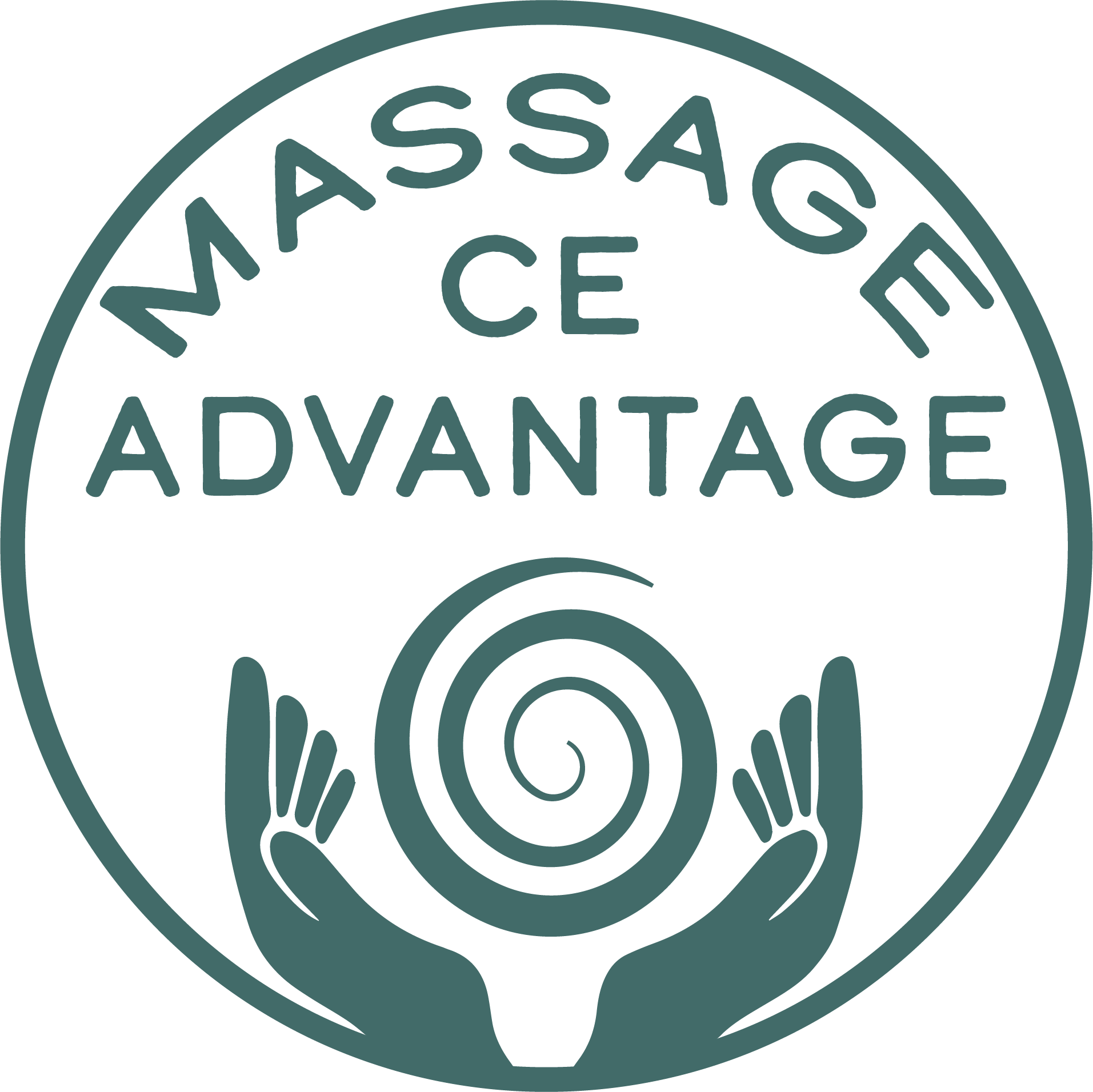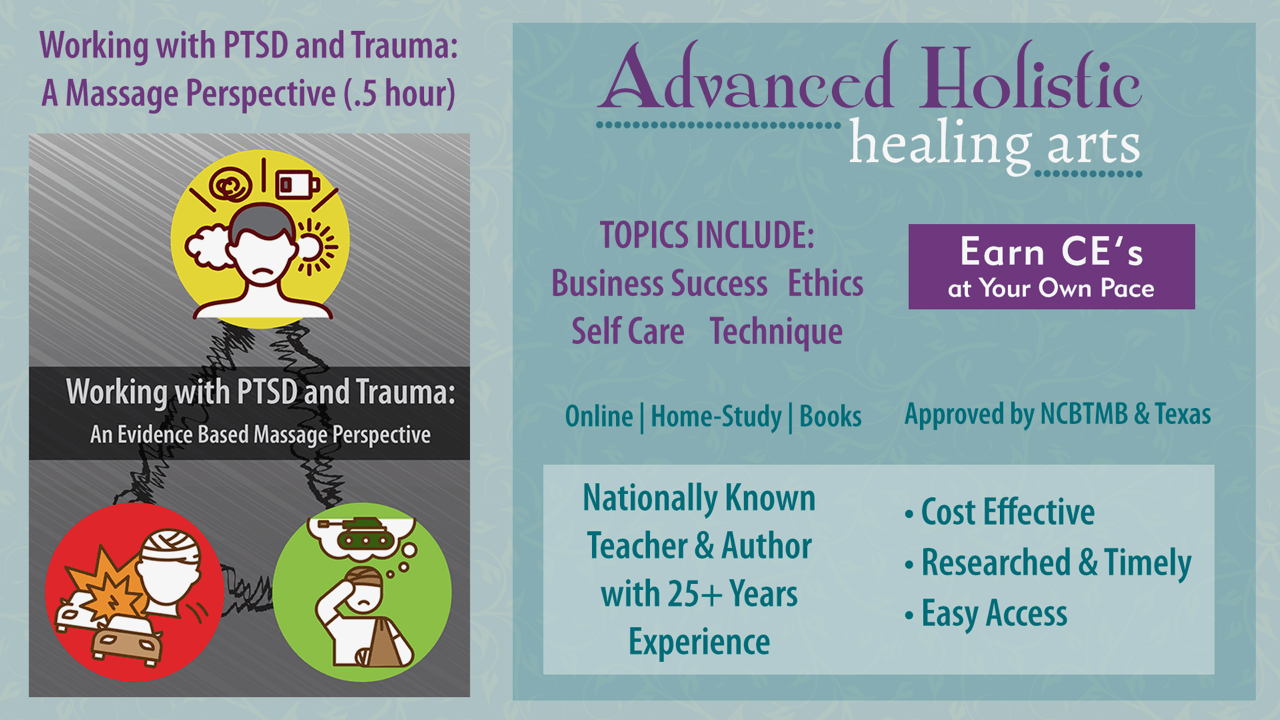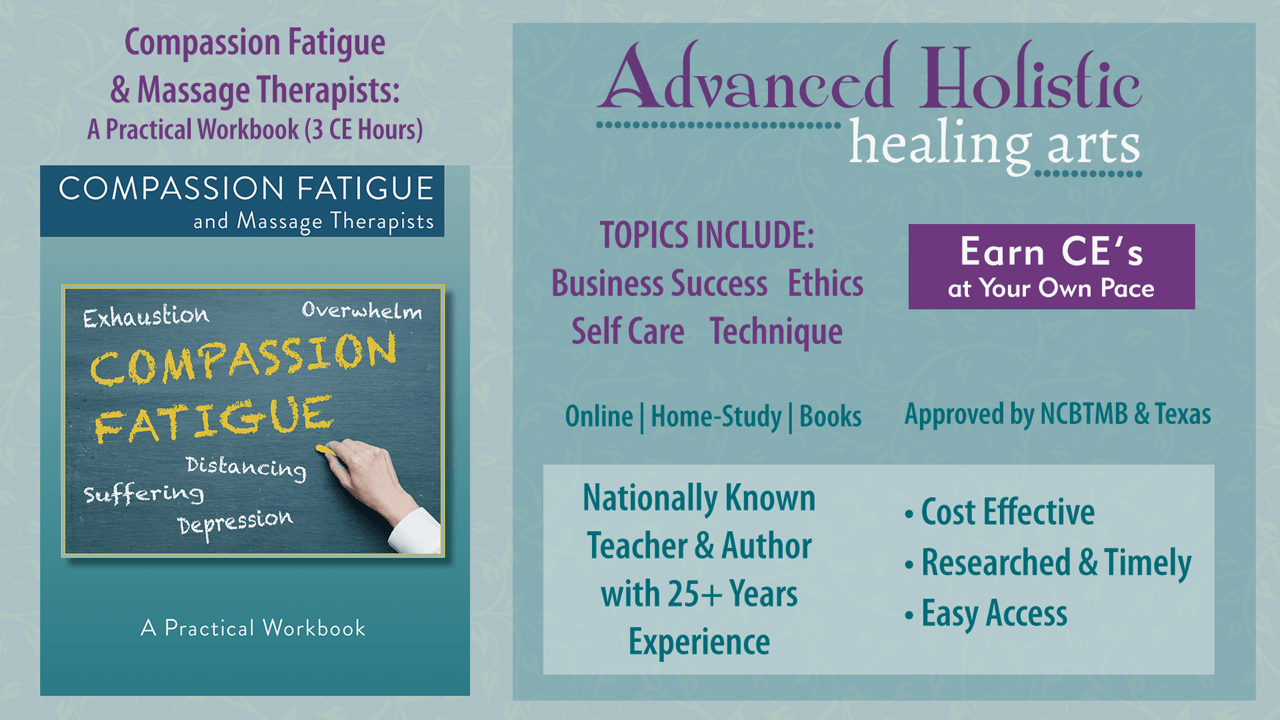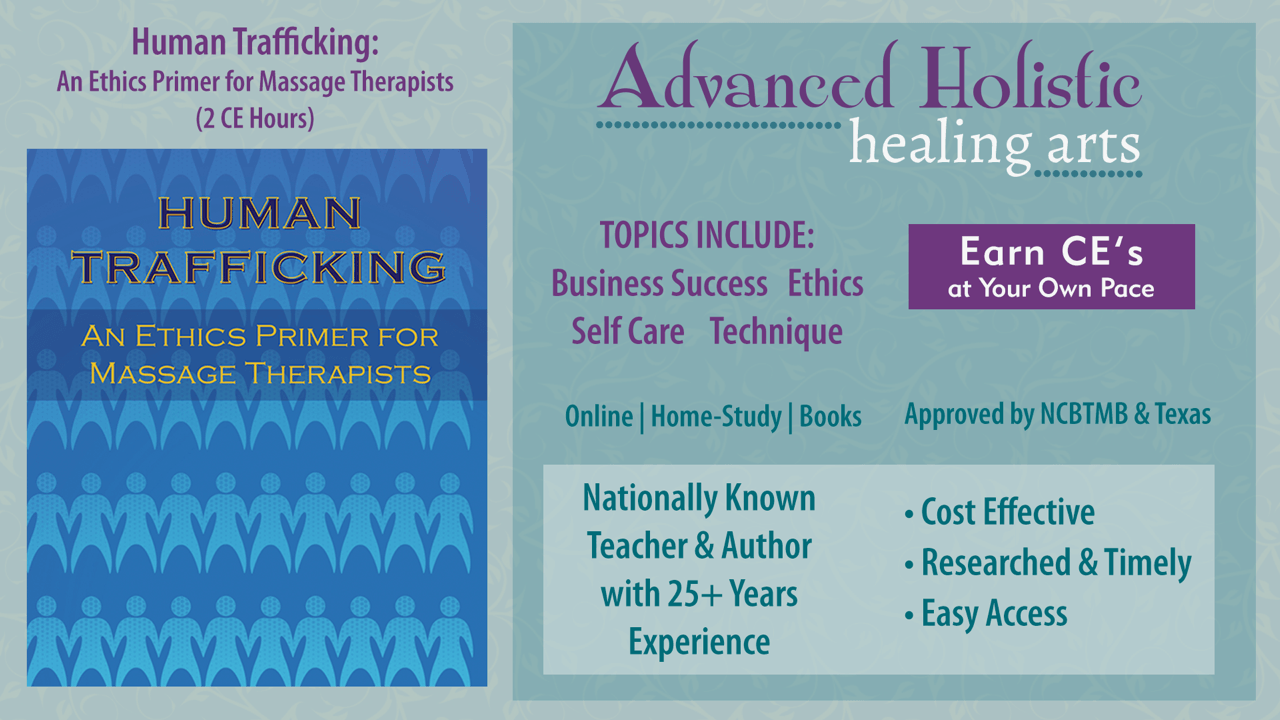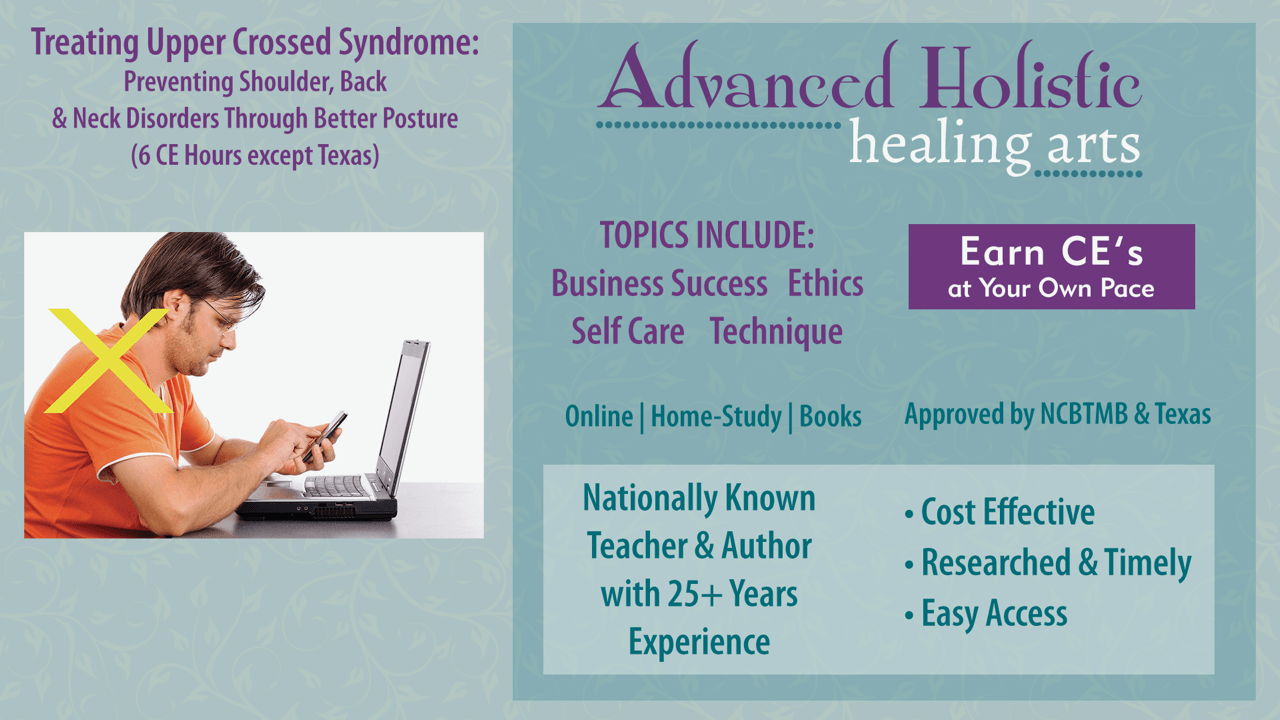Online Classes
Working with PTSD and Trauma: A Massage Perspective
Instructor: Michelle Burns
.5 CEs
PTSD is the abbreviation for Post Traumatic Stress Disorder. It is a psychiatric disorder that can occur following the experience or witnessing of a life-threatening event. About 10 percent of women and 5 percent of men will experience PTSD in their lifetime with about 1 in 30 adults in the United States suffering from the disorder at any given time and about 8 percent of Americans will be diagnosed in their lifetime. While exploring signs and symptoms of PTSD and trauma, the characteristics of the 3 classes of PTSD, and the different ways PTSD and trauma can manifest during a session, we will learn how massage therapy can positively impact clients suffering from these conditions.
The class will explore: the definition of PTSD, the 3 classes of PTSD, symptoms, causes and predispositions to PTSD, Polyvagal theory, treatments available, managing a client crisis, developing a treatment plan and some helpful bodywork techniques.
Online or at home self-paced study information at:
https://www.holistichealingarts.net/class-catalog/
Compassion fatigue and Massage Therapists: A Practical Workbook
Instructor: Michelle Burns
3 CEs
The expectation that we can be immersed in suffering and loss daily and not be touched by it is as unrealistic as expecting to be able to walk through water without getting wet.” Rachel Remen, Kitchen Table Wisdom 1996
Ideally, as caring therapists, we should feel satisfied with our work and derive satisfaction from providing excellent care. But even the most caring and compassionate therapist can find themselves losing satisfaction in a job done well. Those working in oncology, who may see more patient deaths than others, are often at a greater risk. We often form close, caring relationships over time with our patients and this can put us at risk for compassion fatigue. This workbook will provide an understanding of compassion fatigue and give the therapist the tools to identify their own symptoms of compassion fatigue as well as tools to prevent and reverse compassion fatigue in the therapist.
Human Trafficking: An Ethics Primer for Massage Therapists
Instructor: Michelle Burns
2 CEs
Human trafficking ought to concern every person, because it’s a debasement of our common humanity. It ought to concern very community, because it tears at the social fabric. It ought to concern every business, because it distorts markets. It ought to concern every nation, because it endangers public health and fuels violence and organized crime. I’m talking about the injustice, the outrage, of human trafficking, which must be called by its true name—modern slavery. President Barack Obama, Sept 24, 2012.
Human trafficking is an incredibly large, mostly secret, and emotionally horrific industry. The business is estimated to bring in $150 billion a year. Unfortunately, most people feel it isn’t something they will see or experience, or ever have to deal with. And we rarely talk about modern slavery, except for a few celebrities who speak out, such as Ashton Kutcher. Most people assume it has to do with the sex industry and so will never affect them. Because we don’t talk about modern slavery, or because we don’t understand it and aren’t well informed about it, the majority are misinformed or just plain unaware.
And those of us in the massage profession can easily wonder why it would matter to us. Many of our professional organizations include statements condemning human trafficking and encouraging therapists to sign a pledge to oppose human trafficking. But we may wonder what this has to do with us and what we could do about it anyway.
This class is designed to remove many of the misconceptions and misunderstandings around human trafficking as well as give you actions you can take and ways you can help. As noted in the quote above from Barack Obama, is concerns every one of us.
Texas regulations require that massage therapists receive training in Human Trafficking.
PLEASE NOTE: this class is NOT NCBTMB approved (NCBTMB will not approve any classes from any provider on this topic for credit)
Treating Upper Crossed Syndrome: Preventing Shoulder, Back, and Neck Disorders through Better Posture
Instructor: Michelle Burns
6 CEs
The human body is designed to be an active body. Our bodies are built to walk and run and move throughout the day. Our human body was not designed to sit for 8 or more hours a day. While our current lifestyle does not seem to be as hard on our body as our ancestors experienced, a typical desk job can cause more physical damage than our ancestors ever experienced. Forcing our bodies to lock into a set position for long periods of time can result in some muscles becoming very tight and some becoming very weak. Our head forward position, known as Upper Crossed Syndrome, can significantly impact a person’s ability to function easily, without pain, and can contribute to a number of debilitating conditions.
This one-day course includes a review of the structures and soft tissue, how imbalances can lead to pain, headaches, and shoulder injuries as well as contribute to other conditions. Class includes significant hands-on practice. Health care workers are often at risk for Upper Crossed Syndrome and this class will provide tools for self care as well as client care. At the end of class, you will have tools to help you and your clients achieve a more healthy and supportive posture.
Contact us today
Contact Us
We will get back to you as soon as possible
Please try again later
All Rights Reserved | Massage CE Advantage
MCEA does not recommend or endorse any CE instructors or classes
